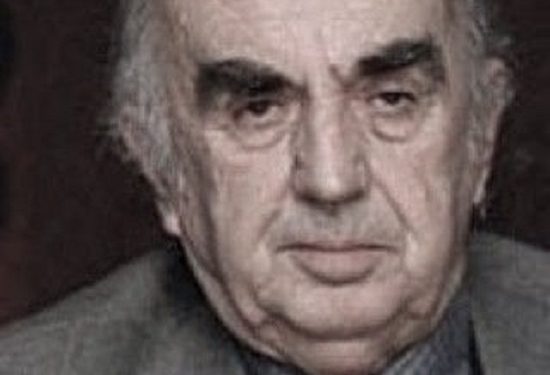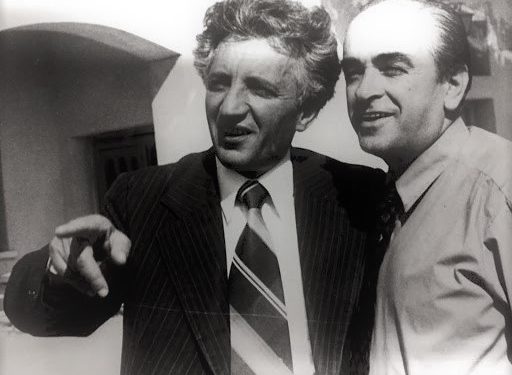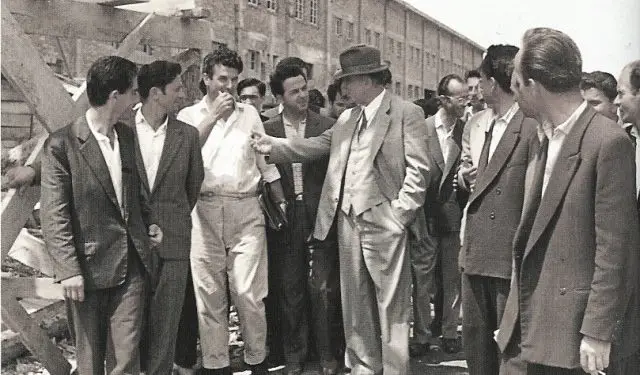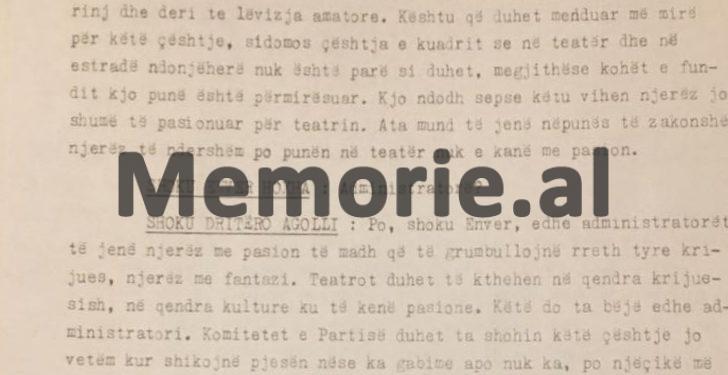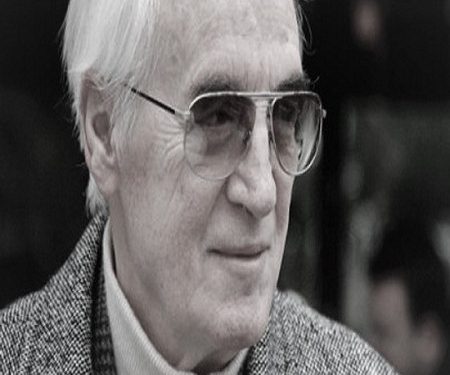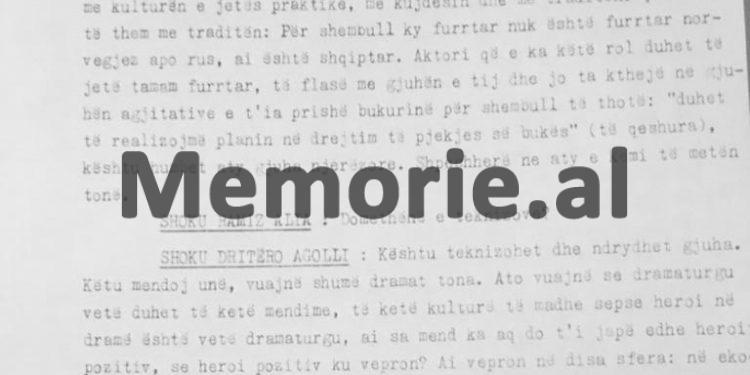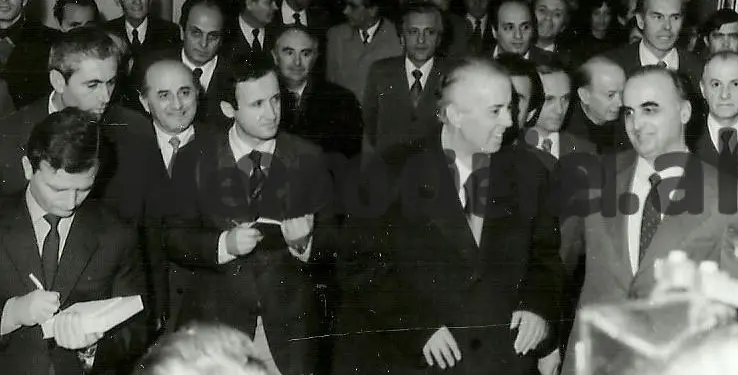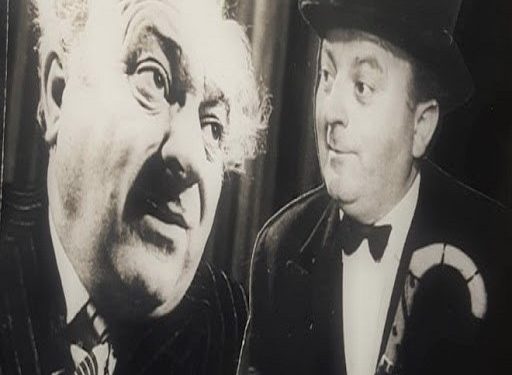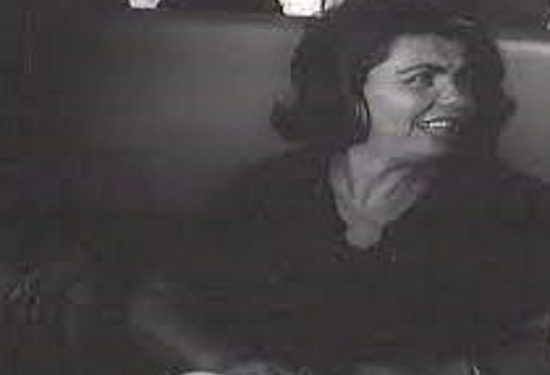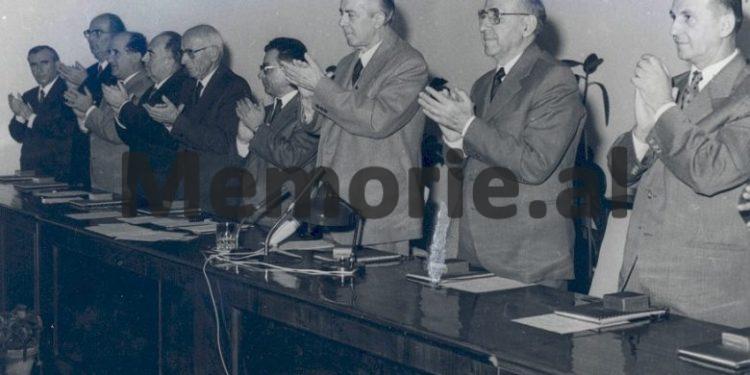Dashnor Kaloçi
Second part
Memorie.al publishes some archival documents extracted from the Central State Archive in Tirana (fund of the former Central Committee of the ALP), where there is a record of the meeting of the Secretariat of the Central Committee held on May 25, 1978 , on the topic: “On a situation and on some problems that arise to increase the ideo-artistic level of professional theater and variety”, which was directed by Enver Hoxha, which was also attended by Ramiz Alia, secretary of the Central Committee covering propaganda , art and culture, Pilo Persiteri, candidate of the Politburo and Director of the Combine Tractor Factory, “Enver Hoxha”, Deputy Minister of Education and Culture, Anastas Kondo and President of the League of Writers and Artists of Albania, Dritëro Agolli. The full minutes of that meeting led by Enver Hoxha, where the famous actor and director of the Albanian theater and cinematography, Pirro Manit, the well-known actress of the National Theater, Violeta Manushi, the professional pop actor were also invited and participated. of the city of Shkodra, Tano Banushi, etc.
“Our theater has a great experience in collaboration with actors – playwrights. Whenever this work was done well, there was a harmony between the author and the theater director, always the results were positive. From this warm cooperation, concrete and not in general, we have left or will remain many dignified works in its golden fund of our scene, starting from the first works such as “Our Land”, “Family of fisherman ”,“ Cuca e maleve ”, etc. I mentioned some of these works which are quite serious. This cooperation, especially recently, has become even stronger, more concrete. In our theater we have a lot of staff who do not work in the theater, but deal with writing and are writers. They not only help us with their works, but they also come to the theater, got acquainted with the process of staging, get acquainted with the laws of the stage, which is more than necessary for the author. We trusted our young people with courage, we felt very close to the whole team, the organization, we old directors and there really were results. For example, Dhimitër Pecani, not himself, m who successfully deputy on our stage, but he also went to Fier where he gave a beautiful play for the theater of Fier. In addition, there are a large number of television directors, such as Albert Minga who has emerged from television, the People’s Theater, as well as Vladimir Prifti and Agim Qirjaqi. So we have to trust the “conductor’s stick” of the director, the young boys to come forward and show talents, because our people are very talented “.
This is what the well-known director of the Pirro Mani Theater said in his discussion, in one of the meetings of the Secretariat of the Central Committee of the ALP held on May 25, 1978, which was chaired by Enver Hoxha, where they participated also Ramiz Alia, Pilo Peristeri, Anastas Kondo and Dritëro Agolli. In that meeting with the topic: “On a situation and on some problems that arise to increase the ideo-artistic level of the creativity of theater and professional variety”, in addition to Pirro Mani, participated the well-known actress of the People’s Theater, Violeta Manushi, actor of the professional stage of the city of Shkodra, Tano Banushi, etc.
For more than what was spoken and discussed in that meeting by Enver Hoxha, Ramiz Alia, Anastas Kondo and Dritëro Agolli, as well as by the guests: Pirro Mani, Violeta Manushi and Tano Banushi, the archival document in question introduces us with the minutes of that meeting of the Secretariat of the Central Committee of the ALP, which Memorie.al publishes for the first time and in full in some issues of the dossier section.
Followed by the last number
Minutes of the meeting of the Secretariat of the Central Committee of the ALP, May 25, 1978
“ON THE SITUATION AND ON SOME PROBLEMS THAT ARISE FOR THE INCREASE OF THE IDEOARTISTIC LEVEL OF THE PROFESSIONAL THEATER AND POETRY CREATIVITY”
COMRADE VIOLETA MANUSHI: Yes, Comrade Enver, it has become like a second life. Take for example the theatrical play “Doctor Patient”, by Rruzhdi Pulaha. In this part a problem of life arises, as we saw the drama talks about hospitals. Since it is about an operation, we went to the hospital, we talked to the doctors about the good experience, about the concerns they have before the operation. We did this precisely to bring the atmosphere of the hospital on stage. In a word, we try to bring life on stage, to raise it in art, with those artistic possibilities.
A good help is also the help we give to amateur groups, but at the same time they help us. We come and teach them, but we also learn from them, through the types we encounter and try to make them artists: we learn, for us it is a great school that we have in our brains many types to present in scene.
Our theater has made it a tradition to help the amateur movement, but it seems to me that this movement is only helped by campaigns, when it comes to competition. I say that every actor should have a working method and not come to help only the last two weeks before the competition. If this is done, then the help will be superficial and the fatigue will be great. So, the assistance should be continuous, but there are obstacles that companies do not evaluate this problem as a whole. There are cases when even now when we come, they do not respond to this great campaign. So we need a better collaboration, a more convincing work from all together to be able to bring on stage more works and talents and better that they have been studied for a long time and it will not happen as it has ever happened that we made a mistake by not bringing it properly.
COMRADE ENVER HOXHA: Well, friend Violeta, many good and necessary thoughts. Even on stage it gives us good things, but even here it gave us a lot of reasonable thoughts and made the right demands for our theater to progress. Here we must make it known to the Party that they are fundamental issues for all the bodies of our theater and variety. Here it is a matter of principle to have a theater, a variety show and another branch of art at a higher level, perfect ideo-artistic related to the current situation. All right, now someone else will talk to us.
COMRADE DRITËRO AGOLLI: In the drama it is noticed that a lot of work has been done. Before 1973, it was a problem that there was no repertoire, or rather we had little. Certainly in this direction has played a negative role the anti-patriarchal work of Fadil Paçrami who always spoke as he thought the “big egg”, which meant: the theater remained with a part. Now, with all the great work that the Party has done, a great transformation has taken place, especially since the Party took over this work. Theater is accumulation, so I think we will have a very good quality hop in theater. It accumulates constantly and this genre of art will move ahead of other arts, for example music, novels, poetry, figurative arts. All of these are ahead of the theater. Such pressure will push the theater as well, it will stick to it necessarily. It is like that pressure that exerts increasing the yield of wheat and corn. The successes of other branches of art will elevate the theater to a high degree.
Nofta I do not have the correct opinion, but I say that the leading role of the Party over the theater should be conceived a little wider than it has been so far. This role, we often times reduce only for the provision of the repertoire and in the content of the drama, whether there are flaws or not. In fact, this role is very wide, from the management staff to the schools, from the training of young playwrights to the amateur movement. So one has to think better about this issue, especially the issue of staff than in theater and variety has never been seen properly, although recently this work has improved. This is because there are people who are not very passionate about theater. They may be ordinary clerks, honest people, but they do not work with theater with passion.
COMRADE ENVER HOXHA: Administrators?
COMRADE DRITËRO AGOLLI: Yes, Comrade Enver. Even administrators should be people with great passion to gather around them creators, people with fantasy. Theaters should be turned into centers of creativity, into cultural centers, where they have passion. The administrator will do the same. Party committees need to look at this issue not only when they look at the part whether there are mistakes, or not, but a little bit wider, to look at the work in perspective. For example, in 1980, we will have 20 Kinostudio films and 15 Television films. If out of five actors are activated, it would take 175 actors a year, then how will this issue be resolved? This applies to both playwrights and directors. With four or five playwrights, we will not solve this job. So we need to encourage and educate young playwrights. This issue, I think, should be seen in the admission to universities and higher institutes, such as, today we have an average for admission to high schools, above grade “8”, but certainly the most preferred is ” 9 ”or“ 10 ”. Now there are talents that show that they can become playwrights, but this one cannot compete with “9” and “10”, that he is really passionate about literature, but he is not good at math or gymnastics. However, these grades lower the average. I think that the Party Committee should make a concession for this talent, and I even say that if the average was seen so strictly, neither I nor Ismail Kadare would be able to compete with the grade “10” in mathematics. We were good students, but not in all subjects, i.e., we would not have higher education if it was seen so strictly, the average grade, so it is for some who are talented, but who may be left without higher education, so I think this should be seen.
I remember Comrade Enver, when you saw a small painting of Sali Shijak, ten years ago. You have said since then that this guy has talent, but we need to educate him. He was sent to study and is one of the best painters. This is how I think the Party should work in the district, when it comes to talented people. From this point of view, I say that we should make forecasts as we do in urban planning, industry, etc. For example, in the Metallurgical Plant, there will be 14,000 workers and together with women make 28 thousand. What if they have two children, then they will become 56 thousand. Given these accounts, it is thought that the school will have and this is planned by the Ministry of Education and Culture, how many clubs there will be, how many houses of culture, etc. It is also necessary to work with the problems of the theater, because, for example, in 1980, we will have a certain number of actors, but in 1990? So this problem must be seen in this prism by ourselves. We, as the Writers ‘and Artists’ League, have a responsibility to discuss these issues further. So far we have discussed it, we have done many seminars and consultations with the Ministry of Education and Culture, but the culture of these seminars should be raised more, because this rise also affects the culture of playwrights. For example, the culture of writing plays, despite the very good results we have, we still have a little low. We do things of international standard, like Fierza Hydropower Plant, Metallurgical Plant, etc., then this international standard should put a little pressure on the culture of writing drama, on the artistic level, because often there is a lot of phraseology, the actor does not speak with the normal language of our man. I was very impressed by your speech, Comrade Enver, in Kasamil, when you talked about the bakery, how bread is baked, how it is made. This is not just about the baker, but it is about the culture of practical life, care and tradition. What I mean by tradition: for example, this baker is not a Norwegian, or Russian baker, he is Albanian. The actor who has this role, should be exactly a baker, speak his language and not turn it into agitating language and spoil its beauty, for example, say: “We have to realize the plan in terms of baking of bread ”. (laughter). This is how human language is lost there. Often times we have our flaw there.
COMRADE RAMIZ ALIA: You mean you technicians?
COMRADE DRITËRO AGOLLI: This is how the language is trained and suppressed. I think so, our dramas suffer a lot. They suffer that the playwright himself must have thoughts, have a great culture, because the hero of the drama is the playwright himself, the more he has in mind, the more he will give to the positive hero, than the positive hero where he acts? It operates in several areas: in economics, in agriculture and in culture. If the writer who writes these has no knowledge in these spheres, then even the positive hero does not speak about them. For example, women play them in faint dramas in the roles they have, as Violeta said. Women do not do well in our dramas, they come out too agitated and shout, quarrel. They misunderstand those contradictions and instead of the woman of our country appearing beautiful and dignified, as our women are, the playwright parks us in such a way that you cannot marry her. (Laughter).
COMRADE ENVER HOXHA: I have Nexhmija’s mother at home. Every time he watches the TV shows, and where is there such a part that shouts, as you say Dritëro, he says: “But why do they shout, Enver, what are they shouting like hell”? They have nothing, I tell him, it’s not the microphone’s fault (Laughter).
COMRADE DRITËRO AGOLLI: I say that all this great accumulation and all this work that has been done will advance the dramaturgy. I was impressed when he said to Anastas Kondos, a Kosovar who was in the ‘May Decade’: “With what you did with the May concerts, in ten years we can do it, i.e., one tenth we can do it”. This great respect of the spectator, we as writers must put before the responsibility. We will hold another plenum of the League, we have prepared it and we will do it in April, but since we will come to the secretariat, we said that we will convey these thoughts and your prospects to the plenum.
COMRADE ANASTAS KONDO: I am talking a little about what Dritëroi said now, about the spectator’s love for dramas. It is a very interesting fact how the increase in the number of spectators has gone from year to year. In 1974, there were 759 thousand, in 1975, there were 862 thousand, in 1976, there were 970 thousand, in 1977, there were 1,020,000 spectators. It is interesting that the interest has increased in the village as well, if in 1974, we had about 154 performances in the village, now we have 326.
You also enjoy the fact that when you see yourself in the theater for the most part, 80% are young and young. This I think has a good effect on the education and leisure engagement of these people. They are getting culture, they are getting love for tradition, for theater, they are getting closer to each other and reacting in a way that makes our theater close. Here it seems to me, is one of the main debts of the theater. The demands are very great, as they are and in a genre for which we are realistic and are aware that we have lower than Theater, such as Estrada, however, the halls are full. But here we should not abuse, we should better drive this problem.
We have a contradiction, which both Dritëroi and Violeta said, the problem of how much we can feed in drama theaters. We need to overcome this quickly. Only one fact is meaningful, the situation is no longer as it was before, that there were only three or four good playwrights. Today we have about 25 real playwrights driving the drama. Now there are such playwrights as Ruzhdi Pulaha, whose plays are arousing interest. This is a good playwright and I think that one of the sources of his success is the fact that he went to Pogradec, because he went to the theater, closer to the people and connected better with the Korça Theater. We note that that author connects well with the theater and solves the problem well. Specifically we can see the drama of Misto Marcos that is being staged recently by the People’s Theater, with the great help of directors, actors, we hope to come out a good drama. The dramas of Ruzhdi Pulaha, Teodor Laço and other authors as well, are good dramas and are liked by the public./Memorie.al
Continues in the next issue





